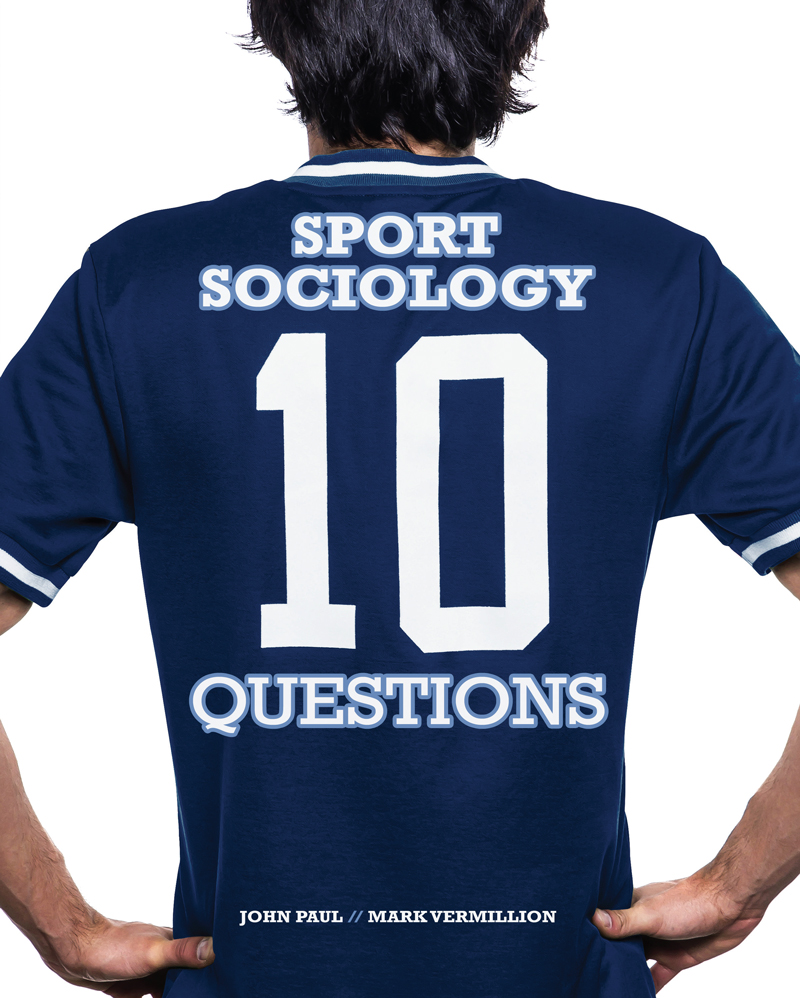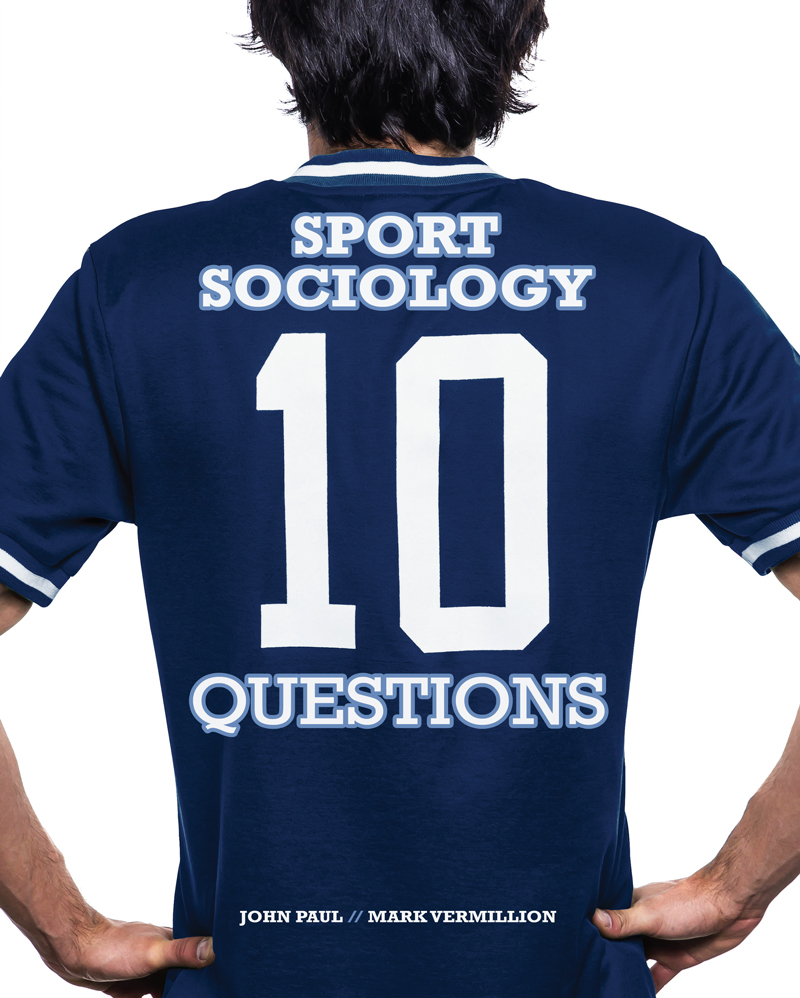Sport Sociology: 10 Questions
Author(s): John Paul , Mark Vermillion
Edition: 1
Copyright: 2018
Pages: 292
Edition: 1
Copyright: 2018
Pages: 290
Ignite Classroom Discussion “Right Off The Bat”
Sport Sociology: 10 Questions fuses sociological theories and concepts (mirrored with experiences from athletes and scholars of sport) to give students an applicable skill in applying the sociological imagination to classic and contemporary events of sport. The publication provides empirical and uniquely sociological insights into the relationships between sports and societal forces of gender, ethnicity, religion, the economy and other institutions.
Sport Sociology: 10 Questions:
- emphasizes various positive and negative aspects of sport in society through commonly asked questions, such as: “Does sport build community?; “Should college athletes be paid?”; “What is the impact of women’s sport on society?”; “Are sports mascots racist?”
- concentrates on American sporting life in addition to highlighting select international aspects of sport (e.g. the Olympics, international sporting events).
- integrates brief essays on popular sports movies in each chapter that illustrate sociological concepts and theories in a fun and accessible way.
- challenges conventional notions of what sport is and is not within the sociological and societal context in which they are played by including a quirky collection of alternative and unusual sporting and recreational pursuits—from chess-boxing, to the sport of wife carrying, to modern day jousting, to competitive video gaming.
Chapter 1 What is sport?
The Wedding of Sport and Sociology
Chapter Summary
Chapter References
Chapter 2 What are the tools that sociologists use to study sport (and society)?
Theoretical Perspective (1): The Power of Socialization
Early Socialization
Family Socialization
The Positive and Negative Effects of Sport Socialization on Women
Learning to be Good or Bad
Theoretical Perspective (2): Groups, Culture, and Conflict
Theoretical Perspective (3) Sport as a Social Institution
Chapter Summary
Chapter References
Chapter 3 Is sport a way out of poverty?
Sport and Social Mobility
Stratified Access to Sport
Class Participation and Sport Infrastructure
Sports of the Poor: Boxing
. . . and Basketball
Sports of the Poor Continued: Baseball and Soccer (Global Football)
Global Football (Soccer)
A “Slave-like” Class: Conditions in College Athletics
Chapter Summary
Chapter References
Chapter 4 Should college athletes be paid?
Power, Authority, and Definitions of Amateurism
Amateur Athletics: Functionalism’s take
Exploitation and Worth: Conflict Theory Weighs In
The Human Cost of Playing
Chapter Summary
Chapter References
Chapter 5 Is sport a bastion for racism?
The Continuing Significance of Race
Casual and Institutional Racism in Sport
Continued Legacies: Racial Stereotypes, Racial Ideologies
Symbolic Forms of Racial Ideology in Sport: White Mascots
American Indian Mascots
One More Mascot: The Coachella Valley High-School Arabs and an example of Change
Chapter Summary
Chapter References
Chapter 6 Why does the end of a sporting career affect one’s identity so dramatically?
Introduction
What is an Identity and How Does it Form?
Self and Identity
Identity Formation: Theories and Processes
Becoming an Athlete. How Athletic Identity Forms and is Maintained
Identity, Role Conflicts, and Student-Athletes
Transition and Identity: Retirement isn’t Just for Professionals
Chapter Summary
Chapter References
Chapter 7 What does it mean to be a “man” in sport?
Historic Frameworks and the Emergence of Hegemonic Masculinity
Historic Frameworks Continued: Male Sports as Symbolic “Cock Fights”
The Sissification of Sport: Masculinity Under Attack
Hyper-Heterosexuality and Homophobia
“Coming Out” and Backlash
Slow Acceptance and the Growth of Alternative Masculinities
Final Thoughts on Masculine Sports Violence and the Body: The Effect of Sport on the Life-Course
Chapter Summary
Chapter References
Chapter 8 What is sport criminology?
Sport Criminology: A Definition
An Overview of Sociological-Criminological Theory
Feminist Criminological Critiques of Professional Sport and the Handling of Domestic Violence
Prominent Criminological Concerns in Sport: Illegitimate vs Legitimate on-the-field Sporting Violence
Problems Associated with Gambling
Specific Criminological Concerns in Sport: Sport as Social Control
Sports in Correctional Institutions
Chapter Summary
Chapter References
Chapter 9 Is sport sexist?
Women’s Participation in Sport as Unnatural
Language and Gender Inequality
Structured and Institutionalized Harassment of Female Athletes
Sexualizing Female Athletes
No Lesbians: How Homophobia Still Rules in Sports
Lawsuits and Protests as Weapons of Change
Chapter Summary
Chapter References
Chapter 10 Does sport build community?
Introduction
What is Community?
Community and Organization
Interpersonal Level
Group Level
Societal Level
Sport and Community Interaction
Sport, Disasters, and Community
Chapter Summary
Chapter References
Closing Remarks
Index
John Paul received his PhD in sociology from Oklahoma State University. His teaching and research interests include the sociology of sport and the sociology of culture, as well as alternative sporting, religious, and artistic subcultures. In addition to his academic research, John engages in applied research, doing consulting work with various criminal justice agencies, using sport and art as modes of correctional reform.
He is a social scientist and applied practitioner with research interests in the areas of crime, social inequity, and justice. He has worked most recently as a domestic violence prevention expert, an embedded criminologist for several law enforcement agencies, and as a police patrol officer.
Mark Vermillion received his PhD in sociology from Oklahoma State University. His teaching and research interests include the sociology and psychology of sport, sport management and ethics, and sport deviance and violence. In addition to his teaching and academic research, Mark engages in applied research, such as consulting with the NCAA and NJCAA affiliated athletic departments regarding survey methods or behavior development plans for student athletes. He has also worked with local sport organizations doing consulting and research services. Mark is currently chair of the department of sport management and executive director of the Partnership for the Advancement of Sport Management at Wichita State University.
Ignite Classroom Discussion “Right Off The Bat”
Sport Sociology: 10 Questions fuses sociological theories and concepts (mirrored with experiences from athletes and scholars of sport) to give students an applicable skill in applying the sociological imagination to classic and contemporary events of sport. The publication provides empirical and uniquely sociological insights into the relationships between sports and societal forces of gender, ethnicity, religion, the economy and other institutions.
Sport Sociology: 10 Questions:
- emphasizes various positive and negative aspects of sport in society through commonly asked questions, such as: “Does sport build community?; “Should college athletes be paid?”; “What is the impact of women’s sport on society?”; “Are sports mascots racist?”
- concentrates on American sporting life in addition to highlighting select international aspects of sport (e.g. the Olympics, international sporting events).
- integrates brief essays on popular sports movies in each chapter that illustrate sociological concepts and theories in a fun and accessible way.
- challenges conventional notions of what sport is and is not within the sociological and societal context in which they are played by including a quirky collection of alternative and unusual sporting and recreational pursuits—from chess-boxing, to the sport of wife carrying, to modern day jousting, to competitive video gaming.
Chapter 1 What is sport?
The Wedding of Sport and Sociology
Chapter Summary
Chapter References
Chapter 2 What are the tools that sociologists use to study sport (and society)?
Theoretical Perspective (1): The Power of Socialization
Early Socialization
Family Socialization
The Positive and Negative Effects of Sport Socialization on Women
Learning to be Good or Bad
Theoretical Perspective (2): Groups, Culture, and Conflict
Theoretical Perspective (3) Sport as a Social Institution
Chapter Summary
Chapter References
Chapter 3 Is sport a way out of poverty?
Sport and Social Mobility
Stratified Access to Sport
Class Participation and Sport Infrastructure
Sports of the Poor: Boxing
. . . and Basketball
Sports of the Poor Continued: Baseball and Soccer (Global Football)
Global Football (Soccer)
A “Slave-like” Class: Conditions in College Athletics
Chapter Summary
Chapter References
Chapter 4 Should college athletes be paid?
Power, Authority, and Definitions of Amateurism
Amateur Athletics: Functionalism’s take
Exploitation and Worth: Conflict Theory Weighs In
The Human Cost of Playing
Chapter Summary
Chapter References
Chapter 5 Is sport a bastion for racism?
The Continuing Significance of Race
Casual and Institutional Racism in Sport
Continued Legacies: Racial Stereotypes, Racial Ideologies
Symbolic Forms of Racial Ideology in Sport: White Mascots
American Indian Mascots
One More Mascot: The Coachella Valley High-School Arabs and an example of Change
Chapter Summary
Chapter References
Chapter 6 Why does the end of a sporting career affect one’s identity so dramatically?
Introduction
What is an Identity and How Does it Form?
Self and Identity
Identity Formation: Theories and Processes
Becoming an Athlete. How Athletic Identity Forms and is Maintained
Identity, Role Conflicts, and Student-Athletes
Transition and Identity: Retirement isn’t Just for Professionals
Chapter Summary
Chapter References
Chapter 7 What does it mean to be a “man” in sport?
Historic Frameworks and the Emergence of Hegemonic Masculinity
Historic Frameworks Continued: Male Sports as Symbolic “Cock Fights”
The Sissification of Sport: Masculinity Under Attack
Hyper-Heterosexuality and Homophobia
“Coming Out” and Backlash
Slow Acceptance and the Growth of Alternative Masculinities
Final Thoughts on Masculine Sports Violence and the Body: The Effect of Sport on the Life-Course
Chapter Summary
Chapter References
Chapter 8 What is sport criminology?
Sport Criminology: A Definition
An Overview of Sociological-Criminological Theory
Feminist Criminological Critiques of Professional Sport and the Handling of Domestic Violence
Prominent Criminological Concerns in Sport: Illegitimate vs Legitimate on-the-field Sporting Violence
Problems Associated with Gambling
Specific Criminological Concerns in Sport: Sport as Social Control
Sports in Correctional Institutions
Chapter Summary
Chapter References
Chapter 9 Is sport sexist?
Women’s Participation in Sport as Unnatural
Language and Gender Inequality
Structured and Institutionalized Harassment of Female Athletes
Sexualizing Female Athletes
No Lesbians: How Homophobia Still Rules in Sports
Lawsuits and Protests as Weapons of Change
Chapter Summary
Chapter References
Chapter 10 Does sport build community?
Introduction
What is Community?
Community and Organization
Interpersonal Level
Group Level
Societal Level
Sport and Community Interaction
Sport, Disasters, and Community
Chapter Summary
Chapter References
Closing Remarks
Index
John Paul received his PhD in sociology from Oklahoma State University. His teaching and research interests include the sociology of sport and the sociology of culture, as well as alternative sporting, religious, and artistic subcultures. In addition to his academic research, John engages in applied research, doing consulting work with various criminal justice agencies, using sport and art as modes of correctional reform.
He is a social scientist and applied practitioner with research interests in the areas of crime, social inequity, and justice. He has worked most recently as a domestic violence prevention expert, an embedded criminologist for several law enforcement agencies, and as a police patrol officer.
Mark Vermillion received his PhD in sociology from Oklahoma State University. His teaching and research interests include the sociology and psychology of sport, sport management and ethics, and sport deviance and violence. In addition to his teaching and academic research, Mark engages in applied research, such as consulting with the NCAA and NJCAA affiliated athletic departments regarding survey methods or behavior development plans for student athletes. He has also worked with local sport organizations doing consulting and research services. Mark is currently chair of the department of sport management and executive director of the Partnership for the Advancement of Sport Management at Wichita State University.

